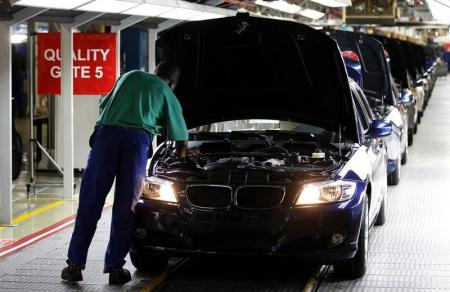
By Mfuneko Toyana
PRETORIA (Reuters) – South Africa’s economy grew its most in six quarters between April and June as declines in the rand helped drive strong growth in mining and manufacturing, offering some breathing space to a government riven by internal tensions.
After shrinking by 1.2 percent quarter on quarter in the three months to March, the economy soared to a growth of 3.3 percent, Statistics South Africa said on Tuesday – a full percentage point better than forecasts in a Reuters poll of economists.
Capital Economics Africa economist John Ashbourne said the surprisingly strong reading “mostly reflects a bounce back following the disaster of Q1”, adding in a note that South Africa’s year-on-year growth rate remained historically weak and the economy was likely to slow in the second half of 2016.
As well as struggling with a volatile political backdrop, Africa’s most industrialised economy has been plagued by falling commodity prices and a chronically high unemployment rate.
The rand, under pressure due to a police investigation into Finance Minister Pravin Gordhan that has left the country flirting with a ratings downgrade to junk level, rose to its firmest in about two weeks after Tuesday’s data. It traded up 2.5 percent at 14.0200 per dollar at 1438 GMT.
The currency weakened to around three-week lows in late August when news broke that Gordhan was facing an inquiry into whether he used a tax service unit to spy on politicians including President Jacob Zuma.
Gordhan said he had done nothing wrong, and opposition parties have portrayed the probe as a witch-hunt by factions linked to Zuma, who has backed his minister but said he cannot stop the investigation.
The presidency denied in May that Zuma was in conflict with Gordhan.
Credit agencies Fitch and Standard & Poor’s, which both rate South Africa one notch above non-investment grade, have said policy uncertainty and political interference could trigger downgrades.
The mining sector led the second quarter growth spurt, expanding by 11.8 percent after an 18.1 contraction in the first quarter. Manufacturing was up 8.1 percent from growth of 0.6 percent previously.
“The improvement in economic activity over the second quarter was widely anticipated, but few expect this pace to be sustained over the next 12 to 18 months,” economists at Nedbank Nicky Weimar and Johannes Khoza said in a note.
Capital Economics Africa’s Ashbourne said the data “supports our view that interest rates will rise later this year”.
The central bank has raised interest rates cumulatively by 200 basis points since early 2014 but kept borrowing costs on hold at its last two policy meetings.
(Editing by James Macharia and John Stonestreet)











